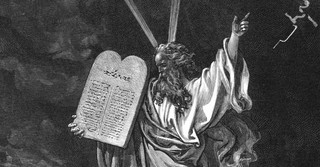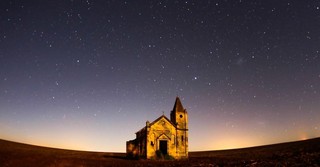7 Biblical Facts That Will Shake Your View of the Sabbath
Share

Because this teaching has fallen into disrepute lately, it is necessary to teach again what the Bible says about it."
We would encourage you to consider the following Scriptural points presented by Tom Hicks. When you read through, don't just hope to come away with stronger doctrine on the Sabbath commandment—expect to see your life completely change when you apply it!

1. The Sabbath was one of God’s very first ideas.
The Sabbath Day is an ordinance of creation.
Just as God instituted marriage and work in the Garden of Eden, so He also instituted Sabbath observance at creation. He set one day in seven aside for rest and worship at the very beginning of the Bible’s story. Genesis 2:3 says, “God blessed the seventh day and made it holy.” Notice that God placed a special blessing or grace upon the Sabbath day, and He “made it holy,” or “sanctified” it, which means that He set that day apart from every other day. Just as we continue to observe the pattern of marriage found in Genesis 2, we should continue to observe the pattern of Sabbath observance found in Genesis 2 as well. Thus, the pattern of the Sabbath ordinance is prescriptive, just as marriage is prescriptive. In fact, Jesus teaches precisely that…
Image Credit: ©Thinkstock

2. Sabbath was given as a gift to us.
…In Mark 2:27, Jesus said, “The Sabbath was made for man, and not man for the Sabbath.” In that passage, Jesus is thinking of the order of creation. Christ’s meaning is, “The Sabbath was created for Adam, and not Adam for the Sabbath.” In other words, God created the Sabbath after He created Adam and Eve in the Garden. God didn’t make human beings slaves to the Sabbath to hurt or burden them; rather, He gave them one holy day in seven on which to rest and worship for their good. Christ showed that the Sabbath continues into the New Testament: “The Son of Man is Lord even of the Sabbath” (Mk 2:28), just as He is Lord of the church, Lord of the family, and Lord of all creation.
Image Credit: ©Thinkstock

3. It was actually put into practice before the 10 Commandments.
The Sabbath Day was observed prior to Sinai.
Some people think the Sabbath commandment was only a ceremonial law of the Mosaic covenant, that it applied only to God’s people under the Old Covenant. But Scripture clearly teaches us that God’s people observed the Sabbath prior to God’s writing it on tablets of stone, which means the Sabbath commandment was not limited to the Mosaic covenant. In Exodus 16, Scripture tells us that the people of Israel gathered up the mana from heaven on the sixth day in order to free themselves for rest and worship on the seventh day. Scripture says, “On the sixth day they gathered twice as much bread, two omers each.... Six days you shall gather it, but on the seventh day, which is a Sabbath, there will be none” (Ex 16:22, 26). Note that Exodus 16 comes before God gave the Sabbath law at Sinai.
Image Credit: ©Thinkstock

4. It’s a serious command.
The Sabbath commandment is one of the Ten Commandments, which makes it a perpetually binding moral law.
The Ten Commandments are unique among all the laws of the Bible. The Bible itself wants us to see the Ten Commandments this way.
Only the Ten Commandments were written with the very finger of God. All of the other laws of the Old Testament were written by the pens of prophets on parchment, which would eventually disintegrate. But God visited His people on Mount Sinai and delivered the Ten Commandments, writing them on permanent tablets of stone with His own finger (Exodus 31:18).
Only the Ten Commandments were given with such a display of God’s power. God gave the Ten Commandments on Mount Sinai with loud thunder, flashes of lightning, a thick cloud, and a “very loud trumpet blast” (Ex 19:16). God made the giving of the Ten Commandments a sensory experience, which the people were never to forget. God was saying, “These laws are unique among all my laws.”
Therefore, since the Sabbath commandment is one of the Ten Commandments, it comes to us with the same force of authority and perpetuity as the other nine commandments.
Image Credit: ©Thinkstock

5. It’s based on creation itself.
The Sabbath commandment is grounded in creation.
If we examine the wording of the Sabbath commandment given at Sinai, we find that God bases His command on creation itself. It’s not based on the temporary ceremonial system of the people of Israel. It’s not based on a temporary epoch in redemptive history. Rather, God grounds the Sabbath on His own actions at the creation of the world. Exodus 20:8, 11 say, “Remember the Sabbath day, to keep it holy.... For in six days the LORD made heaven and earth, the sea, and all that is in them, and rested the seventh day. Therefore the LORD blessed the Sabbath day and made it holy.”
Note the preposition for. This shows us that the reason we should observe a Sabbath day is that God rested on the Sabbath day and made that day holy.
Image Credit: ©Unsplash
.800w.tn.jpg)
6. Sabbath is part of our true identity.
The Sabbath Commandment is written on the hearts of New Covenant members.
God promises that all the members of the New Covenant will have the Old Covenant law written on their hearts so that they will obey God freely and faithfully from the heart. God says that in the New Covenant, “I will put my laws into their minds and write them on their hearts” (Heb 8:10). Literally, the word write could be translated “carve,” which calls to mind the image of God carving His law onto the tablets of stone. This is consistent with what 2 Corinthians 3:3 says about how in the New Covenant, God writes his truth, “not on tablets of stone, but on tablets of human hearts.”
(See also Hebrews 7:18 and Hebrews 8:10)
Image Credit: ©Unsplash

7. It may have changed days, but it always follows 6 days of work.
In the New Testament, the Sabbath moved from Saturday to Sunday.
The book of Acts teaches us that while the Old Covenant church observed the Sabbath on the last day of the week, the New Covenant church observes the Sabbath on Sunday, the first day of the week to celebrate not only creation, but also Christ’s glorious resurrection. See Acts 20:7 , 1 Corinthians 16:2, and Revelations 1:10.
The transfer of the day of worship from Saturday to Sunday does not violate the Sabbath command, since what it requires is a pattern of six days of work followed by one Sabbath day. In the New Testament believers worked Monday through Saturday, and observed the New Covenant Sabbath on Sunday.
Now, the practical part.
Are you following the Sabbath? There are 4 areas you need to test:
Image Credit: ©Unsplash

Are you following the Sabbath? (4 Things to Test)
To start off, let me say that I am loathe to hand out prescriptive applications of the Sabbath, since that’s what the Pharisees did. I believe that pastors should simply teach what the Bible says, apply it as far as it’s clear, but must refrain from issuing commands that the Bible does not issue. In light of the [preceding] teaching on the Sabbath, however, consider some of the following questions for your own personal application.
Here is what you need to test:
Image Credit: ©Unsplash

1. Time
Am I observing the Sabbath Day? Am I observing a whole day unto the Lord with God’s people, attending all of His commanded means of grace?
Image Credit: ©Unsplash

2. Preparation
Am I preparing during the week for Sabbath observance? Do I get my work done on six days of the week so I can rest spiritually and worship on the seventh with God’s people?
Image Credit: ©Thinkstock

3. Structure
Do I structure my whole life around God’s design for six days of work (at home, at work, in the community) and one day of rest and worship (with the church)? Do I allow God’s creational rhythm to organize my own time and existence in this world? Or do I believe that I am lord of my own time?
Image Credit: ©Unsplash

4. Sacrifice
Am I willing to sacrifice extra-curricular activities and entertainments for the church’s assembly on the Lord’s Day? There is nothing wrong at all with extra-curricular activities and entertainment, when they’re in their proper place! They can be blessings. But do I allow these things to interfere with God’s appointment of one day in seven as spiritual rest and worship?
Jon English Lee has a great historical series on the Sabbath commandment here at the Founders Blog.
Based on the original article by Tom Hicks, “6 Biblical Reasons to Observe the Sabbath.”
Image Credit: ©Unsplash